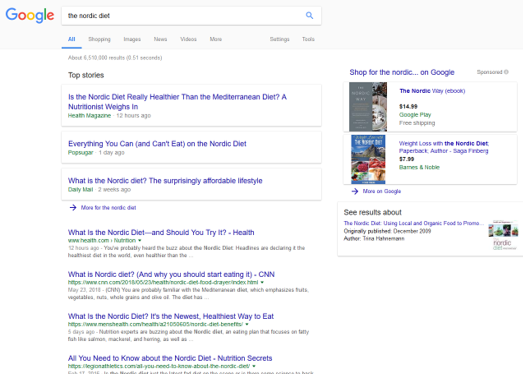
Diet Trends
There are already thousands of articles presenting a topical analysis of the popular trend, the Nordic diet. As usual, there are lists of what you can eat and what you cannot eat followed by comments regarding what should be eaten in moderation. Plenty of books have already been published on the topic, many of which follow the ‘weight loss’ sales trend in the title. Here is a screenshot of a google search:

I don’t have a problem with the Nordic diet, but I do question the purpose of the obsession. This is remarkably similar to the Mediterranean diet, which was also covered in thousands of articles and books. One of the few differences is the choice of oil: Canola oil is preferred in the Nordic diet, and olive oil is preferred in the Mediterranean diet. Hundreds of additional articles will analyze the difference in omega 3/6 ratios between the two.
Why is healthy eating labeled as a diet?
Choosing to eat a normal range of foods which are beneficial to the body should not be considered a diet. Both the Nordic and Mediterranean plans certainly lean in that direction. Additional trends including Vegan, Vegetarian, and Paleo diets aren’t usually discussed in the same sentence, but those lean closer to an appropriate ‘diet’ label. The Vegan and Vegetarian diets avoid all meats, while the paleo diet usually results in the over consumption of meats while avoiding all grains. The Ketogenic diet is another interesting extreme.
For two years I was on a ketogenic diet which helped me optimize control of neuron firing in my brain (aka avoid experiencing complex partial seizures). My caloric intake was about 75% fat, 20% protein, and 5% carbohydrates. It was certainly fair to call that a diet. If I was eating at a restaurant I saved up my 20% protein allocation for the fish or steak I would order. For the first time I saw food as a necessary means of energy intake to optimize my function. It was remarkably easy to buy only whole, unprocessed foods.
Food manufacturers love to follow the diet trends and produce packaged foods which fit the numerical criteria for diet trends. ‘Cut the Carbs’, although fitting for the Ketogenic diet, is one of my least favorite diet labels, especially since the carbohydrate calories are usually replaced with bulk fillers and/or artificial ingredients. A few other idiotic pet peeves include the ‘no added sugar’ label on nuts or any other whole food as well as the ‘fat free’ label on fruit drinks and pure sugar candy. The human body requires unaltered calories including carbohydrates, fat, and protein as well as nutrients for healthy function.
Processed Foods are Outpacing Human Evolution
For thousands of years humans ate foods which had undergone minimal processing, and the biological human system adapted to the consistent habit. Within the last 70 years the human race has transitioned to processed foodstuff replacements which taste different, last longer, and fund the food manufacturer that ‘built it’. Unfortunately, our metabolic systems have not been able to adapt that quickly. As issues including obesity, diabetes, chron’s, alzheimer’s, etc. are becoming the norm, we are introducing plenty of revolutionary drugs to treat them. Yes, that was off topic: WE ARE OVERLOOKING THE CAUSE.
I started to question the purpose of foodstuff replacements such as soft drinks (LOW FAT!) and chips (LOW SALT!).
Soft Drinks: I once paid a food manufacturer $1 to add carbon dioxide gas, 10-30 grams of sugar, food coloring, and stabilizers to water. I drank the beverage which spiked my blood sugar, forced my liver to process additives, and forced my fat tissues to store additives which my GI tract absorbed but couldn’t digest.
Chips: I once paid a manufacturer $3 to overheat and chemically modify potato, corn, and wheat starches with inexpensive oils which are high in omega-6 fatty acids and trans fats. I ate the chips which spiked my blood sugar, forced my liver to process chemically modified proteins (acrylamide), high levels of omega-6 fatty acids, and trans fats. As my body was overloaded with these foreign chemicals, cholesterol was my last resort to neutralize them. Unfortunately, my oxidized cholesterol and LDL blood levels increased.
What benefit was I attaining from eating these foods? The isolated time-frame of satisfaction is a decent argument, but that was only there if I consistently ate them. Now, it is fairly repulsive to taste either option since my taste buds aren’t attuned to eating food replacements. I was paying additional money to lower my potentials.
My Personal Dietary Conclusion
Eventually, I switched from the ketogenic diet back to more regular eating habits. In my ‘regular diet’, if the food contains added sugar, heated starches, processed oils, trans fats, artificial coloring, chemically modified additives, mono and diglycerides, added emulsifiers, etc., I will not eat it. I eat food, and I will stay on this diet until I lose at least 5 more pounds of muscle mass due to inactivity and lack of required nutrient supplies since I desire to maintain optimal health. I would rather not pay a food manufacturer to reconstruct, modify, and overprice modified foodstuffs, and I don’t believe my body ever adapted to the foodstuff replacements I used to eat.
It could be argued that my diet is similar to the Nordic, Mediterranean, or Paleo diet, but it is certainly higher in fat than what is considered ideal by many (I’d love to hear your arguments!). Vegetables and healthy fats (avocados, nuts, and oils) are my main food focus for every meal. My caloric intake of protein is still about 20%, carbohydrate intake has increased to about 30%, and fat intake is at about 50%. Most of my carbohydrate intake comes from vegetables, rice, beans, and lentils as well as occasional berries and other fruit. Most of my protein intake comes from nuts, seeds, lentils, bone broth, local eggs, and occasional meat. I am also a huge fan of healthy spices including turmeric, cinnamon, cayenne pepper, cumin, ginger, and garlic to name a few.
Please let me know if you would like me to cover any of these topics in more detail!
1 COMMENT
[…] recent post discussed the Nordic and Mediterranean diet trends. This section will overview two others: the Vegan and the Paleo diet. The vegan diet recommends […]
Comments are closed.